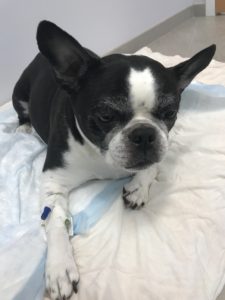I’m writing this on the eve of the most important road trip of our lives.
On 6/15, Kona Bear my sweet Boston Terrier/French Bulldog mix was diagnosed with a 3cm Glioma tumor in the right frontal lobe. The day prior, she presented alarming neurological symptoms that her vet was ill-equipped to handle. Her diagnostic odyssey was similar to mine.
That fateful Friday afternoon, Kona’s neurologist pulled me in a room and showed me the MRI images before the entire scan had been completed. My worst fear was confirmed. My best friend was given 4-8 weeks to live without an intervention.
Fast forward two weeks, and we received confirmation from Dr. Bentley at Purdue University that Kona will undergo surgery to remove her tumor on July 5th. Three weeks after she first showed signs of something being wrong. In the time between diagnosis and our trip, my life has been filled with extreme highs and lows. It was topped off with Kona having a seizure on my face this past Friday night. I was asleep in bed with her when she walked over to me before it started. Thankfully, I had an idea of what to do. Before that, Kona had not had a seizure in my presence (if at all).
Once I began researching Canine Glioma, I was shocked to discover how closely linked dogs are to humans. We are the two species that grow primary brain tumors and our DNA is similar, making research on canines very valuable and easier to translate for human trials. Additionally, dogs and humans live in the same environments and are exposed to similar variables, so the documented side effects from clinical trials are more meaningful. Despite this, the outcomes for both canine and human glioma are grim.
I am dedicated to saving Kona and furthering science. I believe Kona holds data that can help researchers better understand glioma, the effects of surgery and chemotherapy for these tumors.
Tomorrow we embark on a new journey to change translational science.
To follow Kona’s journey, like her Facebook Page: Kona Strong.


